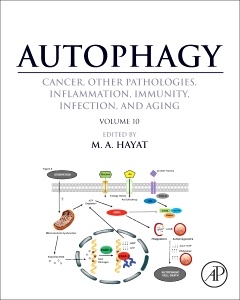Description
Autophagy: Cancer, Other Pathologies, Inflammation, Immunity, Infection, and Aging
Volume 10
Coordinator: Hayat M. A.
Language: English
Subjects for Autophagy: Cancer, Other Pathologies, Inflammation...:
Support: Print on demand
Description
/li>Contents
/li>Biography
/li>Comment
/li>
Autophagy: Cancer, Other Pathologies, Inflammation, Immunity, Infection, and Aging, Volume 10 offer a valuable guide to both cellular processes, while encouraging researchers to explore their potentially important connections. Autophagy serves to maintain healthy cells, tissues, and organs, but also promotes cancer survival and growth of established tumors. Impaired or deregulated autophagy can also contribute to disease pathogenesis.
This is the tenth volume of the multivolume series that discusses, in detail, almost all aspects of the autophagy machinery in the context of health, cancer, and other pathologies. Autophagy maintains homeostasis during starvation or stress conditions by balancing the synthesis of cellular components and their deregulation by autophagy. Volume 10 of the Autophagy series discusses the role of a novel binuclear palladacycle complex that inhibits melanoma growth through apoptosis and autophagy.
I. Molecular Mechanisms Chapter 1. Overview of Autophagy Chapter 2. Molecular Mechanisms Underlying the Degradation of Peroxisomes Chapter 3. Role of Poly (ADP-Ribose) in Catalyzing Starvation-Induced Autophagy Chapter 4. Cross-Talk Between Autophagy and Death Receptor Signaling Pathways Chapter 5. Role of Autophagy in Mammalian Embryogenesis: Response to Developmental Programs Chapter 6. Autophagy in Adipose Tissue Chapter 7. Prevention of Adverse Metabolic Consequences of Adipocyte Dysfunction Using MR Antagonists Chapter 8. A Rapid Method for Detecting Autophagy Activity in Live Cells Using Cellometer Image Cytometry
II. Role in Disease Chapter 9. CDC37: Implications in Regulation of Kinases and Proteins Linked to Neurodegenerative and Other Diseases Chapter 10. Autophagy in the Degeneration of Optic Nerve and Spinal Cord Axons Chapter 11. Membrane Type-1 Matrix Metalloproteinase-Regulated Autophagy: A Role in Brain Cancer Chemoresistance Chapter 12. Induction of Autophagy and Apoptosis in Melanoma Treated with Palladacycle Complexes Chapter 13. Autophagy in Atherosclerosis
- Presents the most advanced information regarding the role of the autophagic system in life and death
- Contains a direct focus on the role of a novel binuclear palladacycle complex that inhibits melanoma growth
- Introduces new, more effective therapeutic strategies in the development of targeted drugs and programmed cell death, providing information that will aid in preventing detrimental inflammation
- States recent advancements in the molecular mechanisms underlying a large number of genetic and epigenetic diseases and abnormalities
- Edited work with chapters authored by leaders in the field from around the globe—the broadest, most expert coverage available




